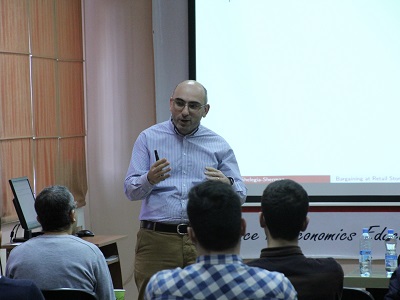On February 19, Sandro Shelegia, an Associate Professor of Pompeu Fabra University, presented to the ISET community a study by Joshua Sherman and himself entitled “Bargaining at Retail Stores: Evidence from Vienna”.
The Associate Professor discussed the step-by-step procedures researchers had to follow to collect reliable data, and the theoretical bases upon which the truthfulness of the analyses strongly depended. The former stage posed major challenge for Shelegia and Sherman as the data they needed — such as the name, scale, and profile of the shop, the price range of the goods sold, etc. — was not available (in a structured form) in any of the existing databases. To tackle the problem, the researchers trained 12 RAs, and identified nearly 300 different retail shops throughout Vienna, Austria, and constructed the valuable database themselves.
On Thursday, February 15, ISET hosted Dr. Vytautas Kuokštis, an Associate Professor at Vilnius University and the Institute of International Relations and Political Science. Dr. Kuokštis gave a presentation entitled “The Political Economy of Internal Adjustment in the Baltics in 2008-10 in the Light of Models of Currency Crises”.
This presentation was focused on the Baltic countries' experience during the Global Recession in 2008-10, and how the nations reacted. The global financial crisis hit the Baltic States much harder than other countries in the EU: Estonia, Latvia and Lithuania all faced a very deep economic downturn, with many outside observers predicting they would devalue and/or default; in other words, they these countries would fail to implement the strategy of internal devaluation/adjustment.
Dr. Tamila Nutsubidze, a consultant at the Healthcare and Social Issues Committee and the Budget and Finance Committee of the Parliament of Georgia, visited ISET to talk about the challenges of the non-contributory pension system in Georgia.
In the first part of the presentation, Dr. Nutsubidze gave a short overview about social/non-contributory pension schemes. According to existing literature, there are possible connections between social pensions and poverty reduction among old age populations. Dr. Nutsubidze highlighted that in most middle-income countries, dependence on a non-contributory pension is caused by the expansion of a substantial coverage gap due to a reduction in the number of workers who contribute to pension schemes.













